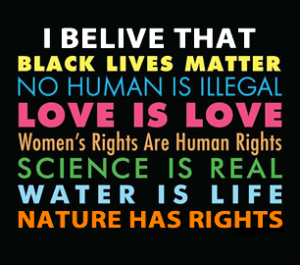What’s Working in the OWS Student Occupation
Last night I wrote an extended critique of the ongoing student occupation at 90 5th Ave here in New York, in particular addressing issues of race and privilege. Now I want to turn the mirror the other way around and suggest what I think we are doing right, and how we can go about improving those things and expanding the occupation in a productive and positive way. I don’t want to leave people with the sole impression that everything in the occupation is a problem, and that no one is working and thinking about the problems and how to expand our movement, as that would not be accurate. I was also pointed out by an NSSR professor who has been involved with the occupation that maybe it’s not the young Marxo-Hegelians who should get the brunt of my critique, but rather the anarchists, insurrectionists and left-communists who are really creating all the problems. So what’s working?
Decision Making
For starters, people have more or less developed a functional decision making structure via a General Assembly. While it’s not without its problems, as is the case in the larger OWS movement as well, I think this GA with modified consensus is an improvement over some other styles of decision making where there is no real consultation. And from what we have seen so far in the larger OWS movement, and as is the case in the occupation, this is still a learning process for many people, as we all come with different levels of understanding and agreement about using a consensus-based decision making process. But at least the occupation is staying true to the spirit of OWS in this sense.
Space Upkeep
Although I raised the issue of messaging and the “writing on the walls” in my last piece, the physical space itself is remarkably clean, largely thanks to the help of a few people who have taken up the mantle of garbage liberators and space cleaners. At the GA last night there was a proposal for rotating shift and the space to be divided up into 5 zones, with regular cleaning schedules for each. Trash and recycling are being sorted. Compost is being collected. The occupation so far has a positive relationship with the maintenance and security staff, who are also SEIU (Local 32 B-J) union members. The occupiers have an arrangement where we maintain the space, and all maintenance really has to do is collect the trash and recycling, re-stock toilet paper and paper towels in the bathrooms, and restock trash bags when they run low. Otherwise the space is largely as it was before the occupation, just with a different internal configuration of space usage. That’s part of the reason I took issue in my earlier critique of the Zuccotti Virus language, cause this is actually not an unsanitary space as some might expect, given that people are living and sleeping in the space 24/7.
Worker Solidarity
So far the working relationship between the occupation and the New School union members has been a positive one, and all of the desk security and maintenance staff that I know or have talked to are supportive of the occupation and the issues we are raising. They get the critiques of Wall Street and job insecurity and union busting and wage issues, much more so than we do, because they are union members and they are up against a massive educational corporation–The New School–who is more than happy to screw them in any contract negotiations as best they can. And there is talk about the upcoming union contracts being re-negotiated and how students in the space can help support those efforts and make the chant “students and workers unite” more than just rhetoric.
Here I think some of my Marxist-leaning friends do understand the class politics better than some of the other issues I have raised, as it is hard to be a Marxist and not understand the relation between labor and capital and ownership of the means of production. None of us–students or workers–really control what happens at the New School. And in that sense, as French New Anti-Capitalist Party leader Olivier Besancenot argued last night in his talk in the occupied space–we are all the proletarian class–intellectual (immaterial) and physical (material) laborers under the banner of the 99%. I think there are some positive developments here that can really put wind in the student occupation sails and should be fostered even more.
Student Solidarity
Another area we are doing a good job in, even if we can still do a lot better, is coordinating and organizing college students around the city. The ongoing NYC All-City Student Assembly, of which the 6th happened this Saturday, as well as the recent Nov 17 Student Strike and Walkout, would not have been possible if we were still a fragmented political movement. The fact that we were able to organize and turn out thousands of students in the rain on Thursday afternoon in Union Square is a testament to that power. The networking and organizing around the upcoming Nov 21st meeting at Baruch College to discuss more tuition hikes at CUNY, and the vote on the 28th, are an important part of building this movement through solidarity actions.
Another is the work to foster more alliances with other student occupations. People were working on a statement of solidarity with students in the UC Davis occupation who were attacked and pepper sprayed by police on Nov 18th. We’ve had meetings with other universities that have sent students to meet with us and build alliances. All of these type of actions are important and need to continue, as they are an important part of our work to build alliances and expand the movement. I’ve even had some discussion with high school students about how to make an assembly at their school or with their peers, and the challenges that are posed by that space in trying to organize.
Political Education
Starting on Saturday there was a regular set of talks and teach-ins and events happening in the space. The People’s University, which normally meets in Washington Square Park, brought Olivier Besancenot, a leader of the French New Anti-Capitalist Party into the space to speak about international solidarity and the importance of the fight we are a part of, and that the whole world is watching us. And other talks, which have included New School faculty, have begun to address some of the underlying social and economic issues that are a part of this larger global crisis.
There is also an occupied film theatre setup in the alcoves of one side of the space. A variety of films have been shown there, and the space, while tiny, works. So now the New School has a movie theatre, all thanks to the occupation! And although there hasn’t been much work yet in producing occupation propaganda and information, there has been a lot of talk about the need to do this, for both educational and outreach purposes. The place where the occupation still needs a lot of work is around self-critique, some of which I have already offered in my last piece, but of which a lot more could be done. There are a lot of issues in this space, questions of unchecked power, questions of class and racial privilege, questions of gender bias and chauvinism, and just plain questions of whether or nor people feel safe in the space. All of these challenges have to be dealt with in some form or another, and some of the people in the occupation are well aware of them and working to address them. There is a safer spaces working group that has tried to start tackling some of these issues. However, as long as it is a working group, and not the whole group, a lot of these issues are not going to be resolved anytime soon.
Turning the Occupation Around
As someone who wants to see our movement succeed and grow, I’m torn about how to best engage at this point. I’ve helped with media and trying to put a public face on what we are doing in whatever limited ways I can. I’ve made proposals to address some of the issues that I have already written about, so far to no avail. I’ve written about what I see happening, and a lot of people have said thank you for speaking truth to power, even if it is our own student power that is at issue. But all of that is still not enough.
If we are serious about turning the occupation into something larger that will grow and build, we have a decision to make. Do we call all of our allies and take over the space, pushing out those minority elements that would rather write slogans on the walls and talk about killing pigs, and who foster a hostile political space full of unchecked privilege, or do we write the space off as a lost cause reproducing all of the problems we are fighting for? As I’ve suggested above, and there are many other examples I haven’t discussed, we are doing a lot of good things that I do support, and think we should do more of. But we need to be smarter about how we are doing it, what message we are putting out there of this occupation, and what discussions and actions we are letting happen–or not happen–in that space. It will never be an active anti-racist and politically emancipated space if those of us fighting for these issues just walk away and wash our hands of it.
So it seems to me that we are at a turning point this coming week. Either the occupied space will continue to function as a space of uncritically challenged forms of privilege and political sloganeering, or it will get serious about the political work that is required and try to address these issues head on, rather than delegating them to a task force and assuming they are just “logistical” issues, rather than the very heart of the problem with this movement. How do we build a new, anti-capitalist, post liberal-democratic political project in that space? I’m not sure at this point, but that’s what I want to see happen. It’s what needs to happen for that space to succeed. Otherwise it will just be another repeat of the 2008 and 2009 occupations with all the same problems repeated.



